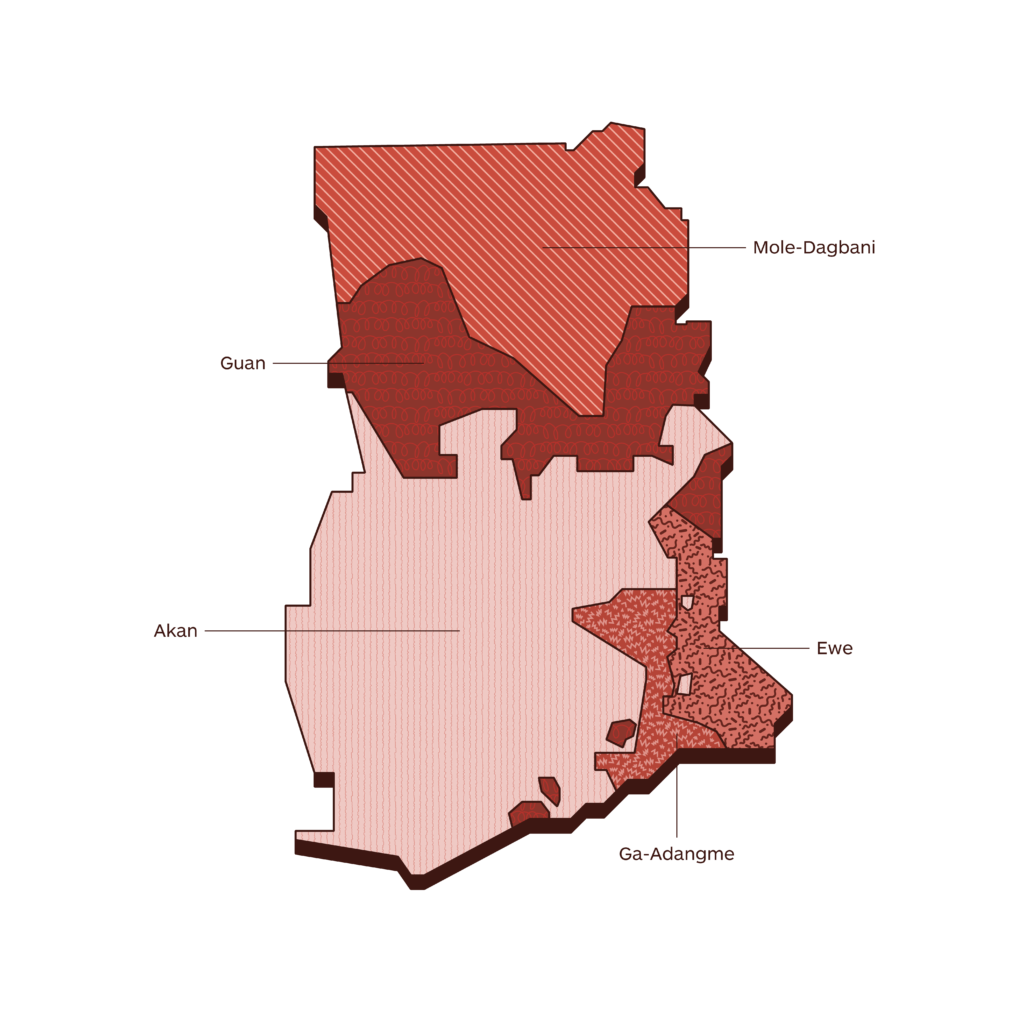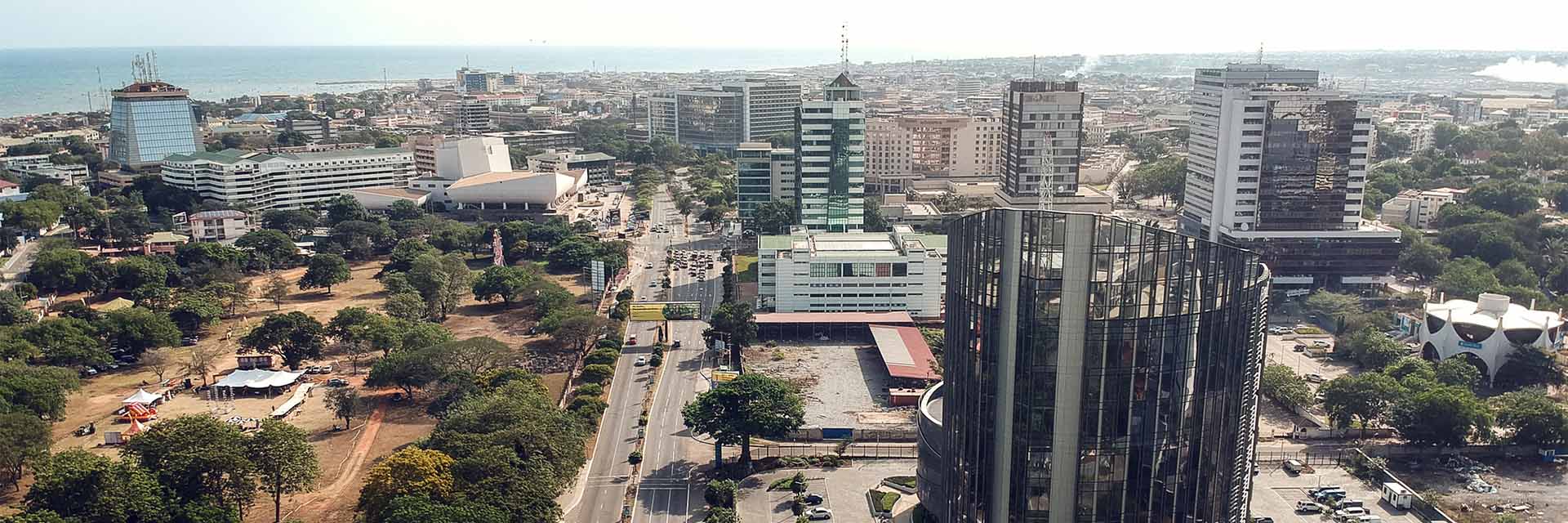Africa
To which language should you translate to localize in Ghana?
What the 150 top websites do
Of the top 150 website (Global by design ranking):
- 33/150 translate into English.
- 7/150 translate into French.
- 1/150 translates into Ghanaian Sign Language.
If you need others information, below you can find a selection of economic/social/cultural data
Overview
Language
Official language
English
T-index
0.1%
T-Index ranks countries according to their potential for online sales.
Actual languages
Ghana has more than seventy ethnic groups, each with its own distinct language.
Akan, also known as Twi, is spoken as a first language by around 11 million Ghanaians, or some 40% of the population. Another 40% use Twi as their second language.
There are nine languages which are sponsored by the government. These languages are Akan languages (Twi languages), Dagaare, Dangbe, Dagbane, Ga, Kasem, Ewe and Nzema. Those languages which are not sponsored by the government include Bimoba, Bassari, Anufo, Adele and Sisaala among others.
Immigrant languages
Chinese, Hindi, Lebanese Arabic, Sindhi, Yoruba
English
Moderate proficiency (EF) – 41 of 111 countries/regions in the world- 4/20 position in Africa.
Demography
Capital: Accra
Currency: Ghanaian cedi
Population: 33.47 m
Population density: 144/km2
Economy
GDP: 72.84 billion USD (2022)
GDP per capita: 2,175.9 USD (2022)
Exports: $14.1 billion (2021)
Statistics
Internet users: 68.2% penetration, 23.05 million
Unemployment rate: 3.4% (2017)
Urbanisation: 59% (2022)
Literacy: 80% (2020)
Conventions
Numbering system
Arabic numerals with comma as decimal separator
Date format: dd – mm – yyyy
Time: 24h time system
Country code: 00233
Language data sources: Worldatlas/Britannica//EF/Wikipedia; Demography data sources: IMF/Worldometers; Conventions data source: Wikipedia; Economy data sources: WTO/OEC/CIA/Esomar/Datareportal; Statistics data sources: Datareportal/WorldBank/UN/UNESCO/CEIC/IMF/Culturalatlas/Commisceoglobal
Facts and data
Economy
Imports
$20.2 billion (2021). Refined Petroleum ($1B), Cars ($629M), Rice ($552M), Delivery Trucks ($474M), and Coated Flat-Rolled Iron ($422M), importing mostly from China ($8.1B), India ($1.1B), Netherlands ($1.04B), United States ($949M), and United Arab Emirates ($826M).
In 2021, Ghana was the world’s biggest importer of Used Clothing ($214M).
Financial inclusion factors (over 15 years of age)
• 39.2% have an account with a financial institution
• 0.9% have a credit card
• 59.7% have a mobile money account
Ease of doing business
Ease of conducting business is medium (rated 60 out of 100). Ranked 13th out of 48 Sub-Saharan African countries. Ranked 118th out of 190 countries worldwide (2022, World Bank).
Exports
$14.1 billion (2021). Gold ($5.29B), Crude Petroleum ($3.57B), Cocoa Beans ($1.51B), Cocoa Paste ($477M), and Coconuts, Brazil Nuts, and Cashews ($477M), exporting mostly to Switzerland ($2.44B), United Arab Emirates ($1.73B), United States ($1.56B), India ($1.53B), and China ($1.27B).
Economic freedom
‘Mostly not free’ (rated 58 out of 100). Ranked 10th out of 47 Sub-Saharan African countries. Ranked 99th out of 186 countries worldwide (2022, Heritage Foundation and Wall Street Journal).
Global Innovation Index
Ranked 5th out of 27 Sub-Saharan African countries, and 95th out of 132 worldwide.
The Global Innovation Index captures the innovation
ecosystem performance of 132 economies and tracks the most recent global innovation trends.
Economy data sources: WTO/OEC/CIA/Esomar/Datareportal
Service Imports (2019)
Service Exports (2019)
Source: OEC
Historical Data Trade Imports
The following section uses historical trade data imports from partners of Ghana.
Historical Data Trade Exports
The following section uses historical trade data exports from partners of Ghana.
Source: OEC
The Top Export Opportunities for Ghana by Relatedness
Relatedness measures the distance between a country's current exports and each product by showing only products that Ghana is not specialized in.
Ghana's Most Complex Exports
The Product Complexity Index (PCI) measures the knowledge intensity of a product by considering the knowledge intensity of its exporters.
Source: OEC
Ghana's Most Specialized Products
Specialization is measured using Revealed Comparative Advantage (RCA), an index that takes the ratio between Ghana observed and expected exports in each product.
Source: OEC
Market Growth Imports (2019)
This score represents the likelihood that the given country will start importing that product in the next few years. It forecasts the opening of a new specific market.
Market Growth Exports (2019)
This score represents the likelihood that the given country will start exporting that product in the next few years. It forecasts the opening of a new specific market.
Source: OEC

T-index
Reach most of the online purchasing power
T-Index ranks countries according to their potential for online sales. It estimates the market share of each country in relation to global e-commerce.
Try it nowMedia
Media language English
Information channels
Ghana enjoys media freedom and the press and broadcasters operate without significant restrictions. The private press is lively and often carries criticism of the government. Lively phone-in shows are staple fare on many radio stations. Scores of private FM radio stations crowd the dial. Most of them are chasing a limited amount of advertising revenue. State-run Ghana Broadcasting Corporation (GBC) runs national TV and radio networks. The BBC broadcasts on 101.3 FM in Accra and on 104.7 FM from Sekondi-Takoradi, the capital of Western Region.
The press
The Ghanaian Chronicle – private daily
Daily Graphic – state-owned
Daily Guide – private
The Ghanaian Times – state-owned daily
The Mirror – weekly, sister paper of the Daily Graphic
The Herald – weekly
Television
Ghana Broadcasting Corporation (GBC) – state-run, operates Ghana TV (GTV) and digital networks, including news channel GBC 24
Metro TV – jointly owned by government and private company
TV3 – private
E.TV Ghana – private
Radio
Ghana Broadcasting Corporation (GBC) – state-run, operates Radio 1 in English and Ghanaian vernaculars, commercial service Radio 2 and local services including Accra’s Uniiq FM
Adom FM – private
Peace FM – private
Joy FM – private
Happy FM – private
News agency
Ghana News Agency – state-run
GhanaWeb – news/information portal
Media data source: BBC
Internet Data
Internet users
68.2% penetration, 23.05 million
Share of web traffic by device
74.28% mobile phones, 24.46% computers (laptops and desktops), 1.25% tablet devices and 0.01% other devices.
Median speed of mobile Internet connection
7.90 Mbps
Median speed of fixed Internet connection
27.70 Mbps
Mobile connection as a percentage of total population: 129.8%
Percentage of mobile connections that are broadband (3G-5G): 92.9%
Most popular web search engines
Google (97.19%), Bing (2.45%), Yahoo! (0.17%), DuckduckGo (0.07%), Petal Search (0.03%), other (0.08%).
Most used social media
Facebook (43.98%), YouTube (17.61%), Twitter (16.83%), Pinterest (11.69%), Instagram (8.04%), LinkedIn (1.32%), Reddit (0.26%), other (0.28%).
Internet data sources: Datareportal/Statcounter
Social statistics
Life expectancy
64 yrs (2021)
Gender
Men are dominant in Ghanaian society, they hold power in community life and in most government positions. Although with education and assertiveness, women are increasingly playing an important role. In politics, government and other areas, important decisions are usually made by men. Husbands are expected to provide for the family and care for the well-being of their wives and children. A wife is expected to respect her husband’s authority in the household. She has to care for the children and carry out the regular domestic chores even though she may be gainfully employed outside the house. Women in Ghana are very entrepreneurial and independent. As a result, the commercial sector in Ghana is predominantly occupied by women.
Class
One is tempted to view Ghana as a classless society. Class is noticeable mainly in the urban areas. The upper and middle classes are predominantly occupied by the well-educated and the rich. They are generally referred to as the elite. People in the major cities show their class, for example, by the vehicles they drive, the clothes they wear and the size and location of their houses. There is another class of Ghanaians who are born into royal families, that is, families of Paramount and Regional Chiefs. The most prominent is the King of Ashanti.
Corruption perceptions Index
Ghana scored 43 out of 100, ranked 72 out of 180 countries worldwide.
Current health expenditure
3.99% of GDP
CO2 emissions
0.6 metric tons per capita
Religion
Religion is built into the culture of the people of Ghana and is responsible for many of the beliefs and traditions. Almost two-thirds of Ghanaians profess the Christian faith, the rest being Muslims and traditionalists. God or Allah is constantly referred to in conversation, proverbs, greetings and explanation of natural events. The Pentecostal and Charismatic churches have been enjoying growing popularity of in Ghana over the last 10 years. Ghanaians participate in many different ritual systems, some based on indigenous religion and others based on various forms of Christianity and Islam. Ghanaian religious groups have a high level of tolerance for each other.
Ethnicity
Ghana has five major ethnic groups. These include Akan, Ewe, Ga-Adangbe, Mole-Dagabane and Guan. The Akans are the dominant group, hence most Ghanaians may speak or understand some form of Akan (Twi) language. Even though Ghanians like to tease each other, there have a very strong bond to their ethnic group. Hence, one should always be cautious when discussing ethnic issues. People turn to be upset easily if stereotype comments or jokes are made about their ethnic group. Intermarriages between various groups are common. However, some are still not comfortable with marrying someone from outside their ethnic group. No part of Ghana is ethnically homogenous, because of migration to Towns and cities in search of employment.
World Happiness Index
Ghana ranked 111 out of 146 countries, with a score of 4.872.
Current education expenditure
91.4% of total expenditure in public institutions.
Social statistics sources: WorldBank/UN/UNESCO/CEIC/IMF
The Data Factbook is a work in progress project. Our community is helping us to fill it up always with new and updated data. Your contribution is precious. If you want to help us, please write your advices at imminent@translated.com
Languages research
Languages spoken in Ghana

Legend
-
Mole-Dagbani
-
Akan
-
Guan
-
Ewe
-
Da-Adangme
The geographical distribution of languages that you will find in the maps published in this section is a work in progress. Our community is helping us to fill it up with always new and updated data. Your contribution is precious. If you want to help us, please write to imminent.factbook@translated.com
Photo credit: Kwame Kwegyir-Addo, iStock
